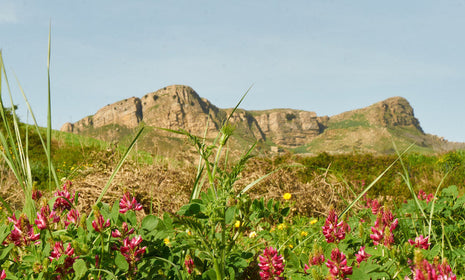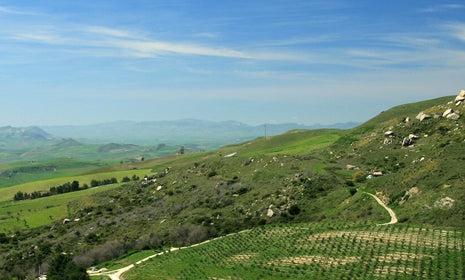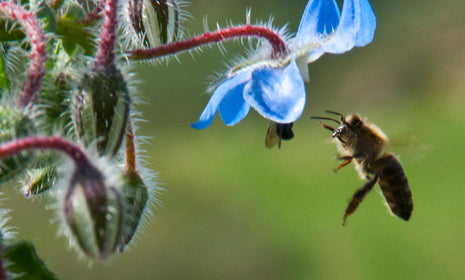At its core, the philosophy around regenerative agriculture is to improve the overall health of our soils by farming less intrusively and more in harmony with nature. Serving as a life giver, nutrient bank, and carbon absorber, soil health is critical to the strength and well-being of our earth as a whole. Operating in direct response to the circumstances of the land, ecology, and its needs guiding pillars include organic practices, the use of cover crops, compost, crop rotation, intercropping, and little-to-no tilling. While most farmers that aim to improve their soil health and fortify its longevity implement a variety of these pillars, their goal is to mimic the natural cycle of the land as closely as possible. As a result, the biodiversity strengthens and aids in invigorating the soil. At the heart of it all is balance.

ORGANIC FARMING
Today, conventional crops are protected from insects and pests by synthetic pesticides, fed with synthetic fertilizers, antibiotics and/or growth hormones, and are often the result of genetic modification. Each of these puzzle pieces fit together to accomplish one thing: high yields in a short amount of time. While this might seem great to accomplish short-term economic growth, these poisons have proven to destroy the health of our ecosystems and the overall health of our planet. Additionally, the use of these synthetic farming aids don’t simply disappear once the crops and animals have grown. Rather, these poisons are directly transferred into our bodies as we consume them. Organic farming eliminates the use of synthetic farming aids and human-manipulated genetic modification. As a result, you can count on organic products to be free of these poisons. Our farm in Corleone, Sicily is 100% certified organic. As we grow to partner with other Italian artisans and farmers, we strive to only partner with organic producers when possible.

COVER CROPS
Cover crops are used in tandem with cash crops to perform a myriad of benefits. These include: mitigating erosion, increasing biodiversity, pest/disease control, attracting pollinators, weed control, improved water distribution, and above all else soil health improvement. By incorporating cover crops into monoculture crops, the yield of the cash crop often increases. It’s a win for the health of the farm, a win for the farmers themselves, and a win for their customers. On La Furtuna Estate, we practice polyculture, managing cover crops throughout the farm to enrich the soil and allow for the natural predation of pathogens on the farm.

COMPOST
Converting organic materials into nutrient-dense soil through aerobic decomposition, composting is an efficient way to repurpose organic waste and turn it into a natural fertilizer. Rather than using synthetic fertilizers to quickly provide plants with select nutrients, compost improves the overall health and fertility of the soil by providing beneficial nutrients and microbes directly to the earth. Made from a combination of brown (sticks, dead leaves, etc.) and green (food scraps, leaves, grass, etc.) waste, compost is an excellent example of a closed-system farming cycle. Byproducts of produce, including our olive pulp, raised on the farm are repurposed to feed and invigorate the next generation of crops. On La Furtuna Estate, we fertilize exclusively with organic matter and composted materials. We compost the olive pulp produced during olive oil production and repurpose it as organic fertilizer for our farm.
CROP ROTATION
Every plant has different needs. From the amount of water needed to thrive, and the nutrients it demands and returns, to the types of pests and weeds it attracts and combats. As a result, soil that houses the same crop over and over again quickly becomes depleted, and the need for chemical fertilizers and pesticides increase in parallel. By practicing crop rotation, farmers allow the land to improve soil health and fertility while naturally combating destructive pests and weeds. Our vegetable crops are rotated throughout the farm to keep the soils balanced and healthy.

INTERCROPPING
Similar to the use of cover crops, intercropping can help to slow erosion, increase soil water retention, and encourage biodiversity. Growing two or more crops in the same field, the primary objective of intercropping is to optimize yields from the same plot of land by planting crops that have different needs and can utilize all the resources available from the same soil. Choosing what crops to plant together is of course crucial as you do not want them to compete for the same resources. In fact, the right combination of plants can mutually benefit depending on the support offered by its companion. On our farm, we practice intercropping to help slow erosion and further encourage natural biodiversity throughout the farm. One example of this is that we plant nitrogen-fixing legumes like fava beans throughout our olive groves. These plants attract pollinators who further enhance the regenerative cycle on the land.
LOW-TO-NO-TILLING
Tilling is used to refresh soil and remove weeds, breaking up the topsoil and mixing it with the earth below. No-tilling can help to increase water infiltration, mitigate erosion, and increase the soil’s ability to store carbon. It also eliminates the use of gas-powered machinery otherwise used to till the land. In the short term, no-tilling can pose a great challenge to farmers. It takes time (4-5 years) for the weeds and crops to properly decompose and naturally fertilize the soil, making room for new crops and offering nutrients and organic matter. In the meantime, the use of herbicides and fertilizers is crucial to keeping the non-tilled land productive. Once the soil has acclimated to this type of farming, however, it has proven to offer higher yields and increase soil organic matter and carbon sequestration.
We operate our 100% organic certified farm in balance with nature to ensure a healthy and thriving biodiversity for all lifeforms. Located within the Monti Sicani biopreserve, we give priority to native plants and wildlife in our efforts to work in harmony with the land and manage it as closely to its natural state as possible. Wild animals roam freely on the property, naturally fertilizing the land as they roam. Implementing mindful farming practices, our goal is to keep our soils balanced and biodiversity thriving to ensure that our footprint within our ecosystem enhances it rather than degrades it. We believe in the long term benefits of regenerative farming, not only for the quality of our ingredients, but also for the health and well-being of our land, community, and planet.





Be the first to comment